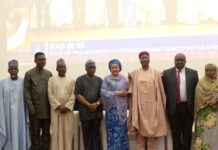
The Leprosy Mission Nigeria (TLMN), an NGO, has called for urgent action by governments to end the disease in Nigeria.
Leprosy is an infectious disease that causes severe, disfiguring skin sores and nerve damage in the arms, legs and skin areas.
The News Agency of Nigeria (NAN) reports that TLMN, a Christian Non-Governmental Organisation held the activity in commemoration of the 2022 World Leprosy Day, which was celebrated on Sunday.
Dr Sunday Udo, National Coordinator, TLMN made the call during an awareness walk organised by the NGO to remind the government and society that leprosy still exists and poses significant threat to the public health if not adequately handled.
Udo said that the awareness also aims to let people know that leprosy can be cured, the signs and symptoms and treatment which is free and accessible at public health care facilities
“Today is World Leprosy Day, it is a significant day in what we do. We want to bring to the consciousness of people that leprosy is still a big problem in this country.
“The theme for this year is united for dignity and do not forget leprosy.
“And that is because we see a lot of attention been paid to other diseases, leprosy is been neglected and we are saying, do not forget leprosy.
“It is still a big problem, it is still a significant public health problem in this country.
“Every day, five persons are diagnosed with leprosy in Nigeria. That means, we all need to come on board to support the National Programme, partners in Nigeria to make sure we defeat leprosy.
“A major challenge we have noticed in leprosy is the stigma and discrimination and hat is really sad because leprosy is curable and it does not take more than six to twelve months to get cured.
“It is not contagious, it is mildly infectious, it does not jump like COVID, so it is not something we should be afraid of. It is curable and treatment is free.
“If you have any skin patch on you, and it is a bit lighter than your normal skin colour it could be leprosy, come out to the nearest health center and get tested and get treated,” Udo said.
Dr Walter Mulombo World Health Organisation (WHO) representative in Nigeria commended TLMN for the awareness walk which he says would help the world body in its fight to eliminating the disease.
Mulombo who was represented by Mr Suleiman Aliyu, Neglected Tropical Disease (NTD) Focal point, WHO, Nigeria said the World Body provides free medicines tor treatment of leprosy and other NTDs in Nigeria and globally.
“This walk is completely important for Nigeria and for the NTD community especially leprosy.
“Because we are raising awareness among our populace and the masses to understand the importance of leprosy prevention, control and that we are aiming towards elimination.
“It is a neglected tropical disease so most people do not know about it or think that it does not exist anymore.
“It is completely treatable and curable and if you detect it early, then you would not have the disabilities that comes with leprosy.
“WHO also provides the medicine for the treatment of leprosy and many other neglected tropical diseases. So yearly, we ship in these drugs for these patients free of charge,” Mulombo said.
Mr Adebayo Peters, The Leprosy Focal Person, National Tuberculosis, Leprosy and Buruli Ulcer Control Programme said Nigeria was working vigorously to meet the WHO target of zero leprosy in children.
Peters lamented the statistics of children who still get infected with leprosy in Nigeria, and the numbers of disabilities from the diseases.
He however expressed optimism that the walk would create more enlightenment to change the narratives.
“For the fact that children are coming down with leprosy which is against the WHO’s target of zero leprosy in children.
“Right now in Nigeria, we still have close to about six per cent of leprosy cases in Nigeria in children and people still come down with disabilities.
“We have disabilities of close to fifteen per cent in the country which shows that cases are reported late.
“So, the essence of the awareness is to make people know that there is still leprosy very much with us and people should not hide when they see patches on their body.
“They should always come out and they will be diagnosed and when the diagnosis is done, treatment is free,” Peters said.
NAN reports that the Nigeria Centre for Disease Control, says over 3,500 people get infected with the disease every year in Nigeria and about 25 per cent of them go on to develop physical disabilities.
(NAN)



